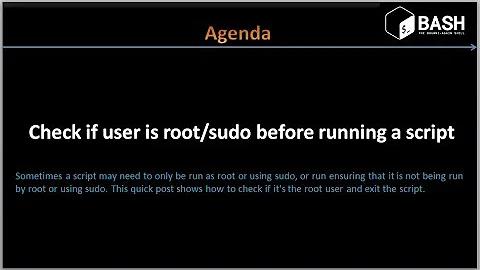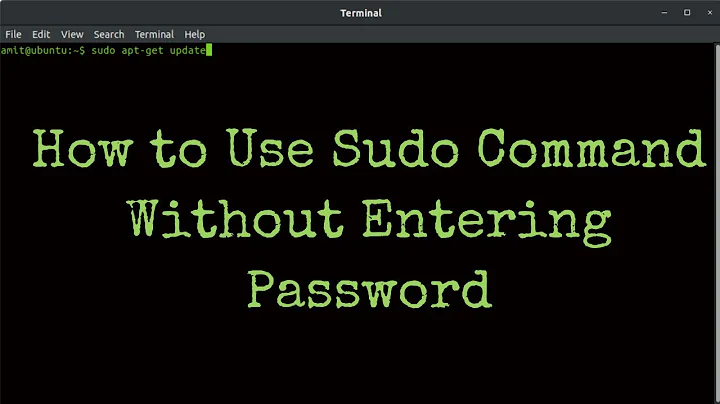How to provide password directly to the sudo su -<someuser> in shell scripting
Solution 1
Use -S
man sudo:
-S, --stdin Write the prompt to the standard error and read the password from the standard input instead of using the terminal device. The password must be followed by a newline character.
so you can use:
echo <myPassword> | sudo -S su <someuser>
Edit: This above did not work on a testing Ubuntu. It seems like the second command "su " is to fast after prompting password query.
I did a workaround to wait a second so the echoed password could be filled in, and then second sudo should be able, to run sudo su - foobar:
echo "password" | sudo -S sleep 1 && sudo su - foobar
Solution 2
With expect. A stub command may be like this:
expect -c '
log_user 0
spawn /usr/bin/sudo su - someuser
expect "*: "
send "thepassword\n"
interact
'
See this answer to a similar question.
Another approach is with sudo -A.
- Create a file, say
pass. - Make the file accessible only to you:
chmod go-rwx pass. - Make it executable to you:
chmod u+x pass -
Edit the file and make it a script that prints your password:
#!/bin/sh printf '%s\n' 'yourpassword' -
Now you can do this:
SUDO_ASKPASS="./pass" sudo -A su - someuser
Note: in this case you provide password for sudo (not for su); use the one sudo wants.
Solution 3
Can you use the :NOPASSWD option of sudo so you don't need a password. Like:
%wheel ALL=(ALL) NOPASSWD: ALL in /etc/sudoers
Related videos on Youtube
raamsaara
Updated on September 18, 2022Comments
-
raamsaara over 1 year
I got a requirement to automate in shell script for
sudo su -<someuser>which asks for password.How to provide password directly to the sudo su - in shell scripting for IBM AIX servers. I have tried using
echo <password> | sudo su -<someuser>it did not work. kindly help on this. -
Kamil Maciorowski over 5 yearsIn my Debian
suexits. Howeversudo su -invoked just after works thanks to cached credentials. It may be a workaround if you can rely on this behavior. -
raamsaara over 5 yearsit is not working.
-
raamsaara over 5 yearsThanks . But where can i incorporate the <someuser>
-
 chloesoe over 5 years@raamsaara: what did exactly not work? did you get an error? meanwhile I edited my answer to add a workaround, which worked on my machine.
chloesoe over 5 years@raamsaara: what did exactly not work? did you get an error? meanwhile I edited my answer to add a workaround, which worked on my machine. -
Kamil Maciorowski over 5 years@raamsaara In
susyntax. Answer improved. -
Binita Bharati over 2 yearsWorks great with Ubuntu 20.04. Thanks!




